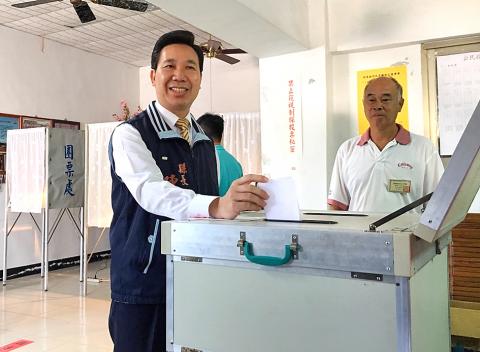Kinmen County residents yesterday voted against legalizing gambling in the outlying county.
The referendum question, formulated by Chinese Nationalist Party (KMT) Kinmen County Councilor Tsai Chun-sheng (蔡春生), asked Kinmen residents whether they supported establishing an “international holiday resort complex” with 5 percent of its space designated for gambling.
Results released by the Kinmen County Election Commission at about 6pm yesterday showed that turnout was 24.17 percent among 114,426 eligible voters, with 24,368, or 90.01 percent, voting “No,” and 2,705, or 9.99 percent, voting “Yes.”

Photo: Wu Cheng-ting, Taipei Times
The polls were open from 8am until 4pm.
An additional 589 null votes were also cast, the commission said.
Kinmen County Commissioner Chen Fu-hai (陳福海) and KMT Legislator Yang Chen-wu (楊鎮浯), whose constituency is in Kinmen, both cast a “No” vote.
Speaking to reporters after casting his ballot, Chen said that the question of whether to build casinos in Kinmen showed that the county’s growth had reached a bottleneck.
He called on governments on both sides of the Taiwan Strait to place more emphasis on Kinmen’s development.
“Gambling is not the only option for Kinmen,” he said, adding that the county, as the nation’s outpost, has an abundance of relics dating back to the Chinese Civil War and traditional Minnan-style buildings and rustic attractions.
Yang said he was “glad” about the outcome, which demonstrated the residents’ “collective wisdom.”
“It showed that Kinmen folks were thinking about development in the long term, instead of being shortsighted and allowing themselves to be lured by profits close at hand,” Yang said.
Alliance Against the Legalization of Gambling executive director Ho Tsung-hsun (何宗勳) said that there were three contributing factors to the outcome.
First, civic awareness in Kinmen has grown in recent years and many residents that are not members of groups opposed to gambling have been campaigning against casinos by making and distributing promotional tools, Ho said.
Second, Kinmen’s demography is mostly comprised of civil servants, giving it a more conservative social setting that is unfavorable to gambling, he said.
China, which has been unequivocal in opposing gambling, also played a role in the outcome, he said.
The Xiamen Daily on the eve of the referendum published an opinion piece by the Chinese government criticizing gambling, which could have had an effect on voters, he said.
In addition, many young Kinmen residents are worried about casinos driving up house prices, Ho said.
The referendum outcome indicates that neither the pan-green nor the pan-blue camp welcomes gambling, Ho said, calling on the Democratic Progressive Party administration to abolish Article 10-2 of the Offshore Islands Development Act (離島建設條例), which governs the establishment of casinos, to free outlying islands from the “threat” of such referendums.
Additional reporting by Sean Lin

Intelligence agents have recorded 510,000 instances of “controversial information” being spread online by the Chinese Communist Party (CCP) so far this year, the National Security Bureau (NSB) said in a report yesterday, as it warned of artificial intelligence (AI) being employed to generate destabilizing misinformation. The bureau submitted a written report to the Legislative Yuan in preparation for National Security Bureau Director-General Tsai Ming-yen’s (蔡明彥) appearance before the Foreign Affairs and National Defense Committee today. The CCP has been using cognitive warfare to divide Taiwanese society by commenting on controversial issues such as Taiwan Semiconductor Manufacturing Co’s (TSMC, 台積電) investments in the

INVESTIGATION: The case is the latest instance of a DPP figure being implicated in an espionage network accused of allegedly leaking information to Chinese intelligence Democratic Progressive Party (DPP) member Ho Jen-chieh (何仁傑) was detained and held incommunicado yesterday on suspicion of spying for China during his tenure as assistant to then-minister of foreign affairs Joseph Wu (吳釗燮). The Taipei District Prosecutors’ Office said Ho was implicated during its investigation into alleged spying activities by former Presidential Office consultant Wu Shang-yu (吳尚雨). Prosecutors said there is reason to believe Ho breached the National Security Act (國家安全法) by leaking classified Ministry of Foreign Affairs information to Chinese intelligence. Following interrogation, prosecutors petitioned the Taipei District Court to detain Ho, citing concerns over potential collusion or tampering of evidence. The

‘COMPREHENSIVE PLAN’: Lin Chia-lung said that the government was ready to talk about a variety of issues, including investment in and purchases from the US The National Stabilization Fund (NSF) yesterday announced that it would step in to staunch stock market losses for the ninth time in the nation’s history. An NSF board meeting, originally scheduled for Monday next week, was moved to yesterday after stocks plummeted in the wake of US President Donald Trump’s announcement of 32 percent tariffs on Taiwan on Wednesday last week. Board members voted to support the stock market with the NT$500 billion (US$15.15 billion) fund, with injections of funds to begin as soon as today. The NSF in 2000 injected NT$120 billion to stabilize stocks, the most ever. The lowest amount it

NEGOTIATIONS: Taiwan has good relations with Washington and the outlook for the negotiations looks promising, Minister of Economic Affairs J.W. Kuo said Taiwan’s GDP growth this year is expected to decrease by 0.43 to 1.61 percentage points due to the effects of US tariffs, National Development Council (NDC) Minister Paul Liu (劉鏡清) said at a meeting of the legislature’s Economics Committee in Taipei yesterday, citing a preliminary estimate by a private research institution. Taiwan’s economy would be significantly affected by the 32 percent “reciprocal” tariffs slapped by the US, which took effect yesterday, Liu said, adding that GDP growth could fall below 3 percent and potentially even dip below 2 percent to 1.53 percent this year. The council has commissioned another institution